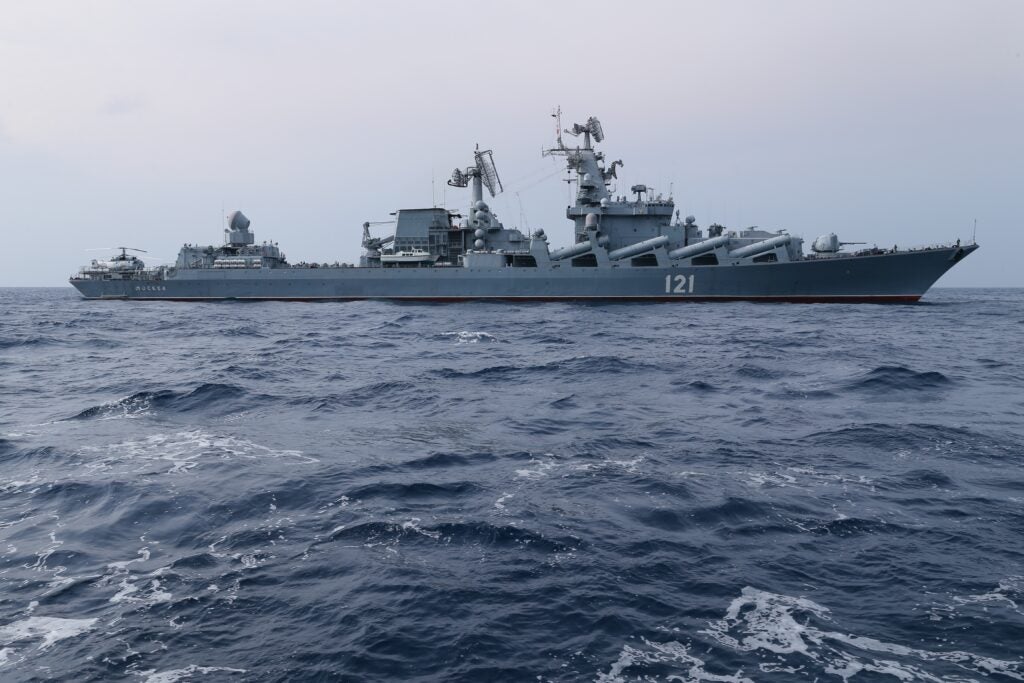Update: This article has been updated after publication to note that Russian state media announced that the Moskva had indeed sunk.
The Russian cruiser Moskva has gone from the “fuck around” to the “find out” phase of combat operations.
In February, a Ukrainian service member defending Snake Island in the Black Sea famously rebuffed a surrender demand from the Moskva by replying, “Russian warship, go fuck yourself.”
It didn’t take long for karma to strike. On Wednesday evening, the Moskva was rocked by a large explosion. Ukrainian forces claimed to have struck the cruiser with two Neptune anti-ship missiles, but the Russian defense ministry initially countered with claims that a fire broke out aboard the vessel after ammunition exploded. After publication, Russian state media reported that the Moskva had sunk.
It is unclear if any of the roughly 500 sailors aboard the Moskva were injured or killed in the explosion. Russia’s defense ministry claimed that the ship’s crew had been evacuated. A senior defense official told reporters on Thursday that damage to the ship was extensive and at the time, the crew was still battling a “significant” fire.
Subscribe to Task & Purpose Today. Get the latest in military news, entertainment, and gear in your inbox daily.
During its final hours on Thursday morning, the Moskva was under its own power, and the prevalent theory at the time was that the Moskva was headed to the Russian naval base of Sevastopol for repair, the official said during a Pentagon news briefing.

The U.S. military cannot definitively say whether the Moskva was hit by missiles or if the explosion aboard the ship was caused by a fire, the senior defense official said. At the time of the blast, the vessel was about 60 nautical miles South of Odessa, and that is in range of Ukraine’s Neptune missiles. But like all surface combatants, the Moskva has plenty of combustible materials onboard.
“What we can see, what we can know, what we can independently verify doesn’t give me — as a former naval officer myself — the confidence to say that this absolutely has to be the result of a missile,” the senior defense official said. “It very well could be. But from what I’ve seen, we’re just not ready to make such a definitive call.”
“It certainly appears from what we have been able to see that the fire aboard her is extensive — it’s big,” the official continued. “It’s not a small fire. But that a fire is big doesn’t necessarily mean that it was caused by a particular munition. These ships have flammable and explosive material on board that can exacerbate even a small source of an explosion or fire.”
As the former flagship of Russia’s Black Sea Fleet, the Moskva was armed with sophisticated sensors and defenses to protect the ship against enemy aircraft and missiles. It is not clear whether the Ukrainians used Turkish-made drones to distract the Moskva prior to the alleged missile strike.
The sinking of the Moskva could be the biggest naval loss of any country since the 1982 Falklands War, when a British nuclear submarine sank the Argentine light cruiser ARA General Belgrano — formerly the USS Phoenix. The Argentinians also sank several British ships including the destroyer HMS Sheffield, which was struck by an Exocet anti-ship missile. (As the Sheffield’s crew formed a human chain in the water, they awaited rescue by singing “Always look on the bright side of life,” from Monty Python’s Life of Brian.)
Other ships have been severely damaged by anti-ship weapons since then and still survived including the frigate USS Stark, which was struck by two Exocet missiles fired by Iraqi fighter in 1987; the frigate USS Samuel B. Roberts, which struck an Iranian mine in 1988; and the cruiser USS Princeton and amphibious assault ship USS Tripoli were damaged by sea mines in 1991.
The U.S. Navy’s most significant losses of naval vessels in recent decades have not been connected to combat at all. Both the amphibious assault ship USS Bonhomme Richard and Los Angeles-class submarine USS Miami were damaged beyond repair by fires while they were in port.
In a bit of irony, the Moskva went down on the 110th anniversary of the British passenger liner RMS Titanic striking an iceberg. A video has already sprung up on Twitter showing the Moskva sailing with the theme song from the movie “Titanic” playing in the background.
What’s new on Task & Purpose
Want to write for Task & Purpose? Click here. Or check out the latest stories on our homepage.
